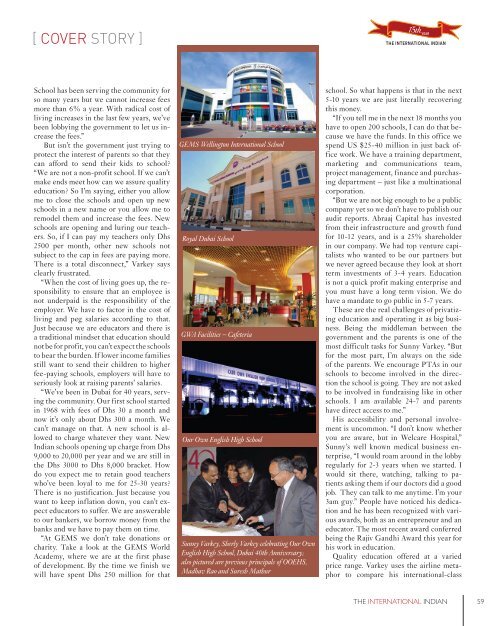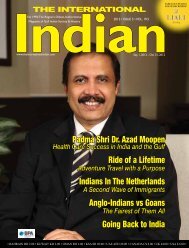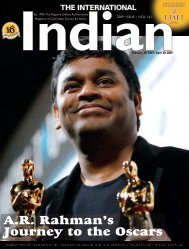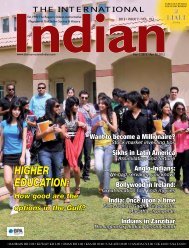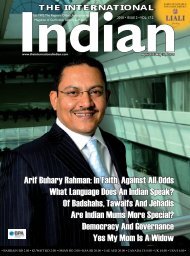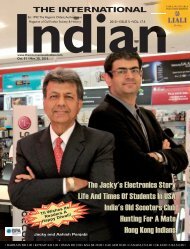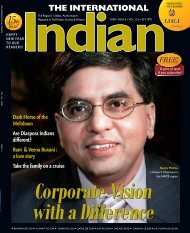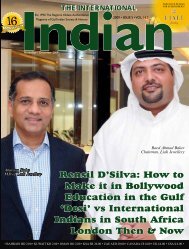THE BUSINESS OF EDUCATION - International Indian
THE BUSINESS OF EDUCATION - International Indian
THE BUSINESS OF EDUCATION - International Indian
Create successful ePaper yourself
Turn your PDF publications into a flip-book with our unique Google optimized e-Paper software.
[ COVER STORy ]<br />
School has been serving the community for<br />
so many years but we cannot increase fees<br />
more than 6% a year. With radical cost of<br />
living increases in the last few years, we’ve<br />
been lobbying the government to let us increase<br />
the fees.”<br />
But isn’t the government just trying to<br />
protect the interest of parents so that they<br />
can afford to send their kids to school?<br />
“We are not a non-profit school. If we can’t<br />
make ends meet how can we assure quality<br />
education? So I’m saying, either you allow<br />
me to close the schools and open up new<br />
schools in a new name or you allow me to<br />
remodel them and increase the fees. New<br />
schools are opening and luring our teachers.<br />
So, if I can pay my teachers only Dhs<br />
2500 per month, other new schools not<br />
subject to the cap in fees are paying more.<br />
There is a total disconnect,” Varkey says<br />
clearly frustrated.<br />
“When the cost of living goes up, the responsibility<br />
to ensure that an employee is<br />
not underpaid is the responsibility of the<br />
employer. We have to factor in the cost of<br />
living and peg salaries according to that.<br />
Just because we are educators and there is<br />
a traditional mindset that education should<br />
not be for profit, you can’t expect the schools<br />
to bear the burden. If lower income families<br />
still want to send their children to higher<br />
fee-paying schools, employers will have to<br />
seriously look at raising parents’ salaries.<br />
“We’ve been in Dubai for 40 years, serving<br />
the community. Our first school started<br />
in 1968 with fees of Dhs 30 a month and<br />
now it’s only about Dhs 300 a month. We<br />
can’t manage on that. A new school is allowed<br />
to charge whatever they want. New<br />
<strong>Indian</strong> schools opening up charge from Dhs<br />
9,000 to 20,000 per year and we are still in<br />
the Dhs 3000 to Dhs 8,000 bracket. How<br />
do you expect me to retain good teachers<br />
who’ve been loyal to me for 25-30 years?<br />
There is no justification. Just because you<br />
want to keep inflation down, you can’t expect<br />
educators to suffer. We are answerable<br />
to our bankers, we borrow money from the<br />
banks and we have to pay them on time.<br />
“At GEMS we don’t take donations or<br />
charity. Take a look at the GEMS World<br />
Academy, where we are at the first phase<br />
of development. By the time we finish we<br />
will have spent Dhs 250 million for that<br />
GEMS Wellington <strong>International</strong> School<br />
Royal Dubai School<br />
GWA Facilities – Cafeteria<br />
Our Own English High School<br />
Sunny Varkey, Sherly Varkey celebrating Our Own<br />
English High School, Dubai 40th Anniversary;<br />
also pictured are previous principals of OOEHS,<br />
Madhav Rao and Suresh Mathur<br />
school. So what happens is that in the next<br />
5-10 years we are just literally recovering<br />
this money.<br />
“If you tell me in the next 18 months you<br />
have to open 200 schools, I can do that because<br />
we have the funds. In this office we<br />
spend US $25-40 million in just back office<br />
work. We have a training department,<br />
marketing and communications team,<br />
project management, finance and purchasing<br />
department – just like a multinational<br />
corporation.<br />
“But we are not big enough to be a public<br />
company yet so we don’t have to publish our<br />
audit reports. Abraaj Capital has invested<br />
from their infrastructure and growth fund<br />
for 10-12 years, and is a 25% shareholder<br />
in our company. We had top venture capitalists<br />
who wanted to be our partners but<br />
we never agreed because they look at short<br />
term investments of 3-4 years. Education<br />
is not a quick profit making enterprise and<br />
you must have a long term vision. We do<br />
have a mandate to go public in 5-7 years.<br />
These are the real challenges of privatizing<br />
education and operating it as big business.<br />
Being the middleman between the<br />
government and the parents is one of the<br />
most difficult tasks for Sunny Varkey. “But<br />
for the most part, I’m always on the side<br />
of the parents. We encourage PTAs in our<br />
schools to become involved in the direction<br />
the school is going. They are not asked<br />
to be involved in fundraising like in other<br />
schools. I am available 24-7 and parents<br />
have direct access to me.”<br />
His accessibility and personal involvement<br />
is uncommon. “I don’t know whether<br />
you are aware, but in Welcare Hospital,”<br />
Sunny’s well known medical business enterprise,<br />
“I would roam around in the lobby<br />
regularly for 2-3 years when we started. I<br />
would sit there, watching, talking to patients<br />
asking them if our doctors did a good<br />
job. They can talk to me anytime. I’m your<br />
3am guy.” People have noticed his dedication<br />
and he has been recognized with various<br />
awards, both as an entrepreneur and an<br />
educator. The most recent award conferred<br />
being the Rajiv Gandhi Award this year for<br />
his work in education.<br />
Quality education offered at a varied<br />
price range. Varkey uses the airline metaphor<br />
to compare his international-class<br />
<strong>THE</strong> INTERNATIONAL INDIAN 59


